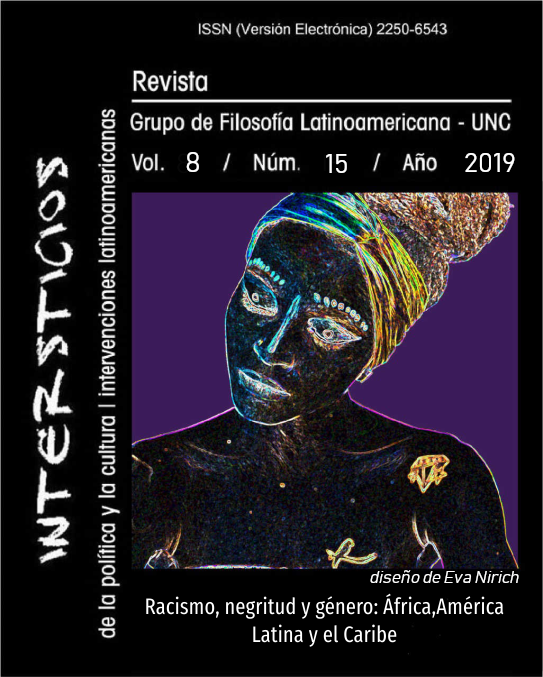The consciousness of the new mestizo in borderlands/the border. The new mestiza by Gloria Anzaldúa. A proposal of epistemic disobedience
Keywords:
descolonialism, epistemicdisobedience, chicano, border, mestiza, feminismAbstract
Abstract
This article is the result of a critical introduction to various aesthetic cultural productions born in the suffering America that express the histories of its people. Specifically, this paper proposes an approach to Gloria Anzaldúa’s border thinking and through it, to the chicano’s history, by addressing her anthropological-literary work Borderlands/La frontera. The New Mestiza (1987). It is understood that logics of power, of being and of knowledge constitute coloniality, conceptualised by Quijano and Mignolo, which is a result of the European colonization and configure the control over bodies, voices and subjectivities. This means that there are categories and legitimated ways of knowing imposed by the European paradigm and reproduced in American people histories and cultures. Faced with this, decolonial theory considers decolonization of being as necessary and postulates epistemic disobedience as a path to the coexistence of different paradigms and to the constitution of exteriority or border epistemologies. Anzaldúa, standing on a physical and conceptual border, shows her own suffering body, geopolitically located, and narrates her personal version of the history of the chicanos from a decolonializing and feministic perspective but above all, from disobedience. Epistemic disobedience is the most persistence phenomenon, manifested in at least three stages of her work: in the multilingual and polymorphic verbal expression, in her self-reference as queer and in the propose of the new mestiza consciousness. The hope of being liberated of the burden of coloniality depends on an actitud of disobedience of what has been hegemonically established, followed by a proposal which integrates a diversity of paradigms.
Downloads
References
Anzaldúa, G. (1987). Borderlands/ La frontera. The New Mestiza. San Francisco: Aunt Lute Books.
Buttler, J. (1990). El género en disputa. España: Paidós.
De Lauretis, T. (2015). Género y teoría queer. Mora, No. 21. Pp. 107-118. Recuperado de http://revistascientificas.filo.uba.ar/index.php/mora/article/view/2402
Dussel, E. (1993). Eurocentrismo y modernidad (Introducción a las lecturas de Frankfurt). En J. Beverley, M. Aronna & J. Oviedo (eds.). The postmodernism debate in Latin America. London: Duke University Press.
Maldonado-Torres, N. (2007). Sobre la colonialidad del ser: contribuciones al desarrollo de un concepto. En Castro-Gómez, S. y Grosfoguel, R. (eds.). El giro decolonial: Reflexiones para una diversidad epistémica más allá del capitalismo global (pp.127-167). Bogotá: Iesco-Pensar-Siglo del Hombre Editores.
Martí, J. (2002). Nuestra América. Edición crítica de Cintio Vitier. México: Universidad de Guadalajara.
Mignolo, W. (2000). Local Histories/Global Designs. Coloniality, subalternity knowledges and border thinking. New Jersey: Princeton University Press.
Mignolo, W. (2007). La idea de América Latina, la herida colonial y la opción decolonial. Barcelona: Gedisa.
Mignolo, W. (2010). Desobediencia Epistémica. Buenos Aires: Del signo.
Quijano, A. (2000). Colonialidad del poder, eurocentrismo y América Latina. Lima: Centro de Investigaciones sociales (CIES).
Downloads
Published
Issue
Section
License
Authors who have publications with this journal agree to the following terms:
a. Authors will retain their copyright and grant the journal the right of first publication of their work, which will simultaneously be subject to the Creative Commons Attribution License that allows third parties to share the work as long as its author and first publication in this journal are indicated.
b. Authors may adopt other non-exclusive license agreements for distribution of the published version of the work (e.g., deposit it in an institutional telematic archive or publish it in a monographic volume) as long as the initial publication in this journal is indicated.
c. Authors are allowed and encouraged to disseminate their work through the Internet (e.g., in institutional telematic archives or on their web page) after the publication process, which may produce interesting exchanges and increase citations of the published work (see The effect of open access).











